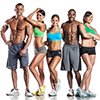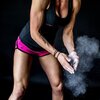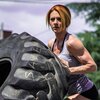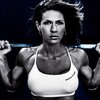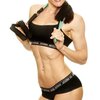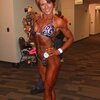Champions are built brick by brick, lift by lift. Subtle and severe changes to their workout regimens test their bodies and minds for a decade sometimes before the perfect combination of training, diet, and supplementation delivers them to the top of a podium.
In fitness, the win isn't always made of gold. For figure athlete and writer Allison Moyer, the win may be a muscle-up, a proper snatch, garnering the courage to embrace CrossFit, even if it raises some eyebrows. It's trying every possibility, so that someday, when this is all over, she can say she gave every last ounce of energy and ingenuity toward nabbing that ever-elusive pro card.
As Allison's success attests, the future of figure doesn't look like the past. It's not all iron and guts. It's diverse training, healthy living, and lots of recovery and mobility. It's working for 10 years to qualify, and basking in the glory of every small victory along the way.
What's your athletic background? How did you get to where you are now?
I've always been physically active, and I've always competed with intensity in some form or another. When I was young, I swam, played soccer and softball, rode horseback, and did competitive show jumping. In junior high I got into field hockey and track and then throughout high school I was active in both indoor and outdoor track and cross country.
I initially ran cross country when I went to college, although only for my freshman season. I felt like I was missing out on the academic and social aspects of college, and I was losing passion for sport running. It was around this time I found my way into the weight room for the first time.
You've competed in figure for years—what are some of your accolades?

My first figure show was so small. It was a NABBA sanctioned show, and I competed it in when I was just 19 or 20. I was such a string bean, with no shape. But I learned a lot about dieting and what it meant to create change in the body through weights and nutrition during that contest prep.
I did my first NPC show in 2007, where I won the overall figure title and qualified for nationals. I did my first national show in 2008 and have competed at the national level since. I think I placed 14th or something that first national show.
Since then I placed top 5 in several shows, won my class in 2011 at the IFBB North Americans, and took third at the 2011 Nationals.
You're also a successful fitness model and have worked with lots of photographers. How did you get involved with modeling?
I was a model previously, before working in the fitness industry. I did some small jobs for companies like Abercrombie & Fitch and Sears in college, back when I was thinner and hadn't discovered weight training.
Initially, a local photographer saw me training and asked if she might take some "fitness" photos for her portfolio. I posted those photos on MySpace (at the time there was no Facebook) and they garnered a great deal of attention.
From there things sort of built over the years and then somewhere in the vicinity of 2011-2012 I began working hard at putting together a solid portfolio. I've been published numerous times, and it's been an honor each time.
I've been fortunate in the photographers I've worked with—I've worked with some amazing talents including Sarah Lyons of PictureGroove Photography, O.A.M.G Photography, LHGFX, Kai York Photography, Andrew Nicholson, Pavel Ythjall, SO Photography, Walt Ostarly, and Justin Price.
How did you discover BodySpace?
I had long since ordered my supplements from Bodybuilding.com and that's how I was introduced to BodySpace.
How important do you believe food and nutrition are to being a better athlete? Any specific plans or ideologies you follow?
There's a Dave Draper quote I love with regard to how I feel about nutrition: "… nutrition is not a scheme to follow for a cheat day as if you needed one. Cheating is for weaklings and "weak" is a characteristic we aim to eliminate. The goal is fed muscle not fat muscle. I've always considered the bragging of weight gain and cheat days to be the signs of someone who truly doesn't understand what the business of building the body is about."

I am strict about how I eat. I don't believe in eating junk—and when I say that, I mean it. I haven't had anything that could qualify as "junk food" in years, nor do I crave or want it. I have called myself paleo, although I'm certainly not the type of paleo purist who eats animal livers and coconut everything and won't touch a starch. I view paleo as a framework, within which to construct your own individual "blend" of paleo. Mine tends to be performance-oriented, and as a result includes some items which would be considered "non-paleo" by the Cordain crowd, but are by no means junk foods.
I tend to avoid all processed foods, sugars, soy, legume, dairy, and wheat and gluten. With a reduction in typically inflammatory foods, I have noticed a decrease in my aches and pains, and improved energy, digestion, and overall well-being. I guess a good way to verbalize my theory on nutrition is that I want to not just eat "clean" but eat optimally. I eat to minimize inflammation, maximize ease of digestion, optimize energy and athletic output, and of course, keep unwanted body fat gains away. I've been called a "food elitist" before, and I guess I am a bit anal, but I prefer to think that I'm discerning about where I get my fuel.
I have a unique situation in that I have IBD (irritable bowel disorder), specifically colitis, so there are a lot of food items out there that I need to avoid in order to avoid a flare and to sustain optimal digestion.
I put my focus and energy into making sure that I eat well to maintain my lean muscle, sustain lower levels of body fat, fuel my strength training, and maintain my level of activity, which is high. I work strategically with John Meadows, my nutritionist, to do this. I've been with him for more than a year now.
I believe in the "food is fuel" mentality. I think too many people associate food with comfort or enjoyment. That's fine, I guess, but as an athlete I think it's imperative to think of your nutrition as fuel, as the raw materials your body needs in order to function optimally. I'm strategic. I weigh and measure year round. I make sure I hit my macros.
I check in with John weekly to re-assess my diet if needed. I don't agree with off-season weight gain and find it just makes the process of preparing for the stage that much harder. I feel balanced in my lifestyle, and I feel that sense of balance is imperative to mental and physical health.
What would it mean to you to win your IFBB pro card?
Just thinking about getting my IFBB pro card brings tears to my eyes and gives me goose bumps. It means more to me than I can verbally express. It would be a validation, recognition of the fact that I've dedicated the last 10 years of my life or so to this process of building my body, and to stepping onstage offering the judges the best of which I'm capable.

How do you think BodySpace has helped you reach your goals?
I think BodySpace offers a unique community in that everyone on the site is fitness oriented. It allows you to connect, socially with other people who share your goals and interests.
What's a day in your life like?
My days are usually much the same. Working from home is a blessing in that I can adjust my work schedule around my training. On average I wake around 4-4:30 a.m. I usually have my morning supplements and coffee before I train around 5:30.
My morning sessions are usually purely conditioning focused. My main focus at the moment is to try to gain some strength and lean muscle. So, once or twice each week I do heavier weighted conditioning work that taxes my muscular strength and endurance. The other sessions are more monostructural (running, swimming, rowing, biking, etc.) but I also include some WOD-style conditioning in my cycle.
I switch it up between low-intensity or steady-paced monostructural activity and HIIT or interval work. I reserve my intense weight training for later in the day when I have more sustenance in me.
By 6:30 a.m. I eat my first meal, answer emails, check my social media accounts, and so on. If I have in-person clients to work with that day, I meet and train them.

Depending on the day, my mornings can consist of:
- Food prep.
- Working. (Client emails, client plans, assessments, consultations, etc.)
- Creating content for my blog, writing. (I write for several online websites)
- Errands.
- Training sessions with my Olympic Lifting/CrossFit coach Brock Stoltz of Ba Athletic.
Usually around 12:30-1 p.m. I start to get myself mentally ready to train, and I usually train between 1:30 and 3:30-4 p.m. My training ranges in length and depending on my goals my sets and reps vary. In general I start my training with some foam rolling, myofascial release or stretching if I need to and then some light activity to get the blood flowing.
I jog or run, sometimes I do some sprints, do some rowing, it really varies. I also like to incorporate some dynamic movements as well. If I do anything overhead—like snatches or jerks—I spend plenty of time on my shoulders. I have mobility issues in external rotation. I usually do some core activation before I begin training as well.
My training is structured, for sure, but I leave room for adjustment. I react largely to how my body feels. So if I don't have a "heavy" day planned but I feel strong, I change it up. If I feel horrible but have a heavy day planned, I may scale it back. In general right now, my focus is to gain strength and add lean muscle, so I work the Olympic Lifts (snatch, clean, jerk) as well as the compounds (squat, bench press, deadlift).
The bulk of my accessory work is focused on bringing up my medial and posterior delts, increasing my back strength, and strengthening my posterior (glutes/hamstrings). I also focus on getting better at skills I struggle with—namely the gymnastics movements of CrossFit.
I try to focus on icing, heating, stretching, soaking, and refueling as well.
Then, in the evening I work some more and try to spend time with my fiance and my dogs. I cook my fiance dinner nightly and then usually spend some time answering more emails and addressing client issues before I head to bed between 8 and 9 p.m. My socializing tends to usually be Internet-based, or needs to happen in the gym.
I'm lucky enough to be surrounded by people who I genuinely respect and enjoy spending time with—I don't have a lot of friends, but the ones I do have I cherish. If there's time and if we want to, my fiance and I may go see a movie on the weekend, or cook dinner together. Sometimes we order out. I'm not very fun to hang out with.
What are you most proud of in figure to date? What about Crossfit?
I think overall, I'm most proud of the lifestyle balance I've achieved. Competing in figure, or bodybuilding, can become challenging, not just physically but mentally. To have your head constantly in a pursuit that is largely based on aesthetics can very unhealthy and as a result I think, it's easy to lose balance and perspective.
Lots of competitors fluctuate in weight, have eating issues, training issues, self-esteem issues—you name it. After being involved in figure for years I think I've finally reached a place in my life where I understand what it means to live a balanced, fitness-centered lifestyle.

I think as far as placings go I am most proud of 2011 Nationals, where I placed third out of a large class of 52 people. As far as CrossFit, I'm too raw to have anything to be proud of. I'd say I'm most proud of my resilience. When I first began CrossFit I took flack for it. CrossFitters saw me as this "fitness chick" playing around at CrossFit and my bodybuilding friends seemed to approach me with this "traitor" mentality. I didn't care—I wanted to learn.
I was interested in the training, and I was determined to become better. I was good at just about nothing when it came to CrossFit, but I kept at it. I still keep at it. I keep learning and striving to be better, which is what fitness is all about.
How has the emergence of CrossFit altered your perception of fitness regimens?
Next to figure, the single greatest fitness impact on my own life as a coach and an athlete has been my discovery of Crossfit. Crossfit took what I thought I knew about health, fitness, and training and just turned it on its head. I used to be so narrow-minded when it came to training—I only knew one way and I was closed off to any other method.
CrossFit helped to open my mind to new training methods and approaches. As a result, I learned about powerlifting, weightlifting, strongman training, endurance training, and a whole host of other methods that helped enhance my training as an athlete and the approaches I use with my clients.
What is your favorite feature on BodySpace?
I love the recent changes to BodySpace—a lot! I specially love the increased ability to interact and communicate with other members through "fit status" updates, etc.
What is your favorite muscle group to train? Favorite body part? Favorite lift?

My favorite muscle group to train would probably be anything emphasizing my back, medial or posterior delts as those are areas I need to work on. In general my favorite lift or exercise are the Olympic lifts, particularly cleans and snatches.
I have loved learning to use my midline and my hips in movement. Once you figure out how to incorporate your hips into all your activities, life gets a lot more forceful and a lot more fun. Right now I'm enjoying squats a lot too.
You've been on BodySpace for a few years. How do you stay motivated for the long term?
I don't believe in motivation as much as I believe in habit. Motivation will come and go, and I'm as human as anyone else in that there are days where I'm tired, or distracted by my personal or work life and I don't have motivation to train.
But training is a part of my day-to-day life that is not negotiable. Year after year of consistent training has made it a solid habit for me, so I never struggle to get my workouts in or to get into the gym or box and do what I need to do.
I think people lose the will to train because they view their training with a skewed perspective to begin with. Instead of seeing training as a single event, or single workout, or week or months work of workouts, you need to look at training as being a lifetime. I've noticed this particularly since I started focusing more on strength—because building strength takes time, a lot of time. It's a slow haul, just like building muscle. It's easy to get discouraged because the higher the level you perform or compete at, the harder it is to see results over a month, several months, or even a year. That can crush you if you let it.
But conversely, if you step back and look at your progress as an athlete across seasons and from year to year, it is easier to take pride in how far you've come. When I look at how my physique looked two years ago versus now, it's a huge change. When I look at my strength a year ago compared to now, the changes are massive. So I think staying interested or focused in training has more to do with how you view training then the training itself.
What training mistakes did you make when you first started? Do you still make mistakes?
Early on I think I made common mistakes:
- Under eating a lot, or being over-dieted.
- Eating too many subpar food choices (I didn't focus on food quality at all).
- Doing way too much steady state cardio.
- I gained too much in the offseason—which only made prepping for a show that much more challenging.
- Trying to coach myself during contest prep.
But I've not only made mistakes, I still make mistakes, all the time. I think too many people are afraid to act, or to try for fear that they'll make a mistake, but in all honesty that's how you learn. That's how I learned.
Credentials are important, to be sure, but I think part of what makes me not only a strong athlete but also an effective coach isn't in my certifications or my scholastic knowledge but my own personal experience.

Over the last decade or so I learned what to do and what works by doing what didn't work. Failures pave the road for successes. Making mistakes is never easy, but it exposes weaknesses and shortcomings and brings them to our attention so we can address them and turn them into strengths.
We've noticed a muscular alteration to modern definitions of sexy. How do you define "sexy?"
While I love that strength, muscularity, and a shapely body have become more appreciated in mainstream notions of "sexy," I don't really like slogans like "strong is the new skinny." I don't like any phrase that puts down one body type in favor or another.
I think sexy is subjective, and I'm an advocate of individuality, in a person's right to shape and build their body in the way they want it to look, in a way that makes them feel confident. Confidence is ultimately what's sexy—loving who you are, and how you look and taking pride in what your body is capable of being.
I define sexy for myself more in terms of how I feel than how I look. I feel I'm sexy when I feel strong in my training, lean and healthy, and energetic in my day-to-day life.
What does your supplement plan look like or what are your favorite supplements?
I am a huge proponent of effective supplementation. Although I practice paleo, which on its face looks down on supplementation, I believe that the needs of an athlete make supplementation damn near essential. Paleo works well for the average person because the goal of the average person is pretty basic: Don't be fat and sick.
The average person doesn't hit the gym day after day in preparation to get onstage, or compete in CrossFit or hit a PR, or walk around with single-digit body fat. So if you have goals that aren't average, I believe your diet or nutrition shouldn't be average. Just like I believe Doritos and cookies don't earn you pro cards or PRs I don't believe coconut milk smoothies and bacon will either. Avoiding advanced supplementation because it's not labeled "paleo" is just absurd, in my opinion.

What I supplement with varies depending upon my goals, but I take a typical assortment of vitamins and minerals: vitamin D, B, C, and magnesium/potassium. I also take a fish oil from WFit Nutrition, which is some seriously good stuff. That along with their tendon and ligament formula helps me eliminate soreness and joint discomfort. I also use AST Nutrition's VP2 (hydrolyzed whey) and WFit Nutrition's Beyond Protein. I take CLA, since I don't eat an abundance of red meat. Performance wise I take BCAA's, L-glutamine, beta-alanine, D-ribose, and arginine.
I naturally have a lean physique and I tend to struggle to hang on to my muscle, so during intense training sessions I use Gaspari Nutrtion's Glycofuse. I use ZMA, melatonin, digestive enzymes, and this is a partial list! There are no miracle pills or powders. I supplement to enhance athletic performance and recovery and to fill up any nutritional deficiencies in my diet.
What recovery techniques do you use, if any?
I don't think bodybuilding emphasizes mobility and recovery enough. I've learned so much about both since doing CrossFit. I swear by foam rolling and myofascial release with a good old lacrosse ball or softball. I also like flossing with the voodoo band, especially on my left shoulder, which suffers greatly in external rotation. It's a simple, yet comprehensively effective, way of dealing with joint restriction and muscle pain.
The top of my list though is professional treatment. I get active release therapy once per week, along with chiropractic adjustments. Every six weeks or so I go for a good deep tissue and stretch therapy session.
Nothing is better than being totally passive and allowing a therapist to have their way with your tissues—self-release is great, foam rolling is great. But, I believe if you actively move, support, and activate your injured tissues or your sub-optimal motor patterns, massage is a barrier to treating and correcting them.
I also am a firm believer in relaxing Epsom salt soaks. I know a lot of people are into ice baths but I believe that ice bathing isn't well-received by the body and the body responds by releasing stress hormones. For the average gym-goer, I guess this may result in a healthy stress adaptation, but for a high-intensity athlete, I think it's overkill.
What has the biggest impact on muscle growth and recovery?
I believe sleep and nutrition, hands down!
What type of music do you listen to in the gym?
I listen to a wide variety of music, but most often I listen to techno/electronic/alternative or rock and in general I listen to a lot of Christian artists. What I listen to changes often but right now:

- "What I Live For"- Rob Bailey and The Hustle Standard
- "Bled For Days" - Static X
- "ShutEmDown"- Celldweller
- "Timestretch: West Coast LoFi Remix"- Bassnectar
- "Plc4 Mie Haed"- Linkin Park, Reanimation
How has your physique changed since you started to take fitness seriously?
My physique has changed and is still changing. I have always taken my fitness seriously, but as my nutrition methods change, as my training methods change, consequently my body and physique changes. I have a much more streamlined physique then I did in former years.
What is your favorite way to spend a rest day?
I actually prefer to take active recovery days rather than rest days, days where I focus a lot on mobility, relaxation, rejuvenation, and low intensity, low-CNS-stimulating movement. I like treating myself to a deep-tissue massage, an Epsom salt soak, or a long walk. Sometimes I take yoga.
Aside from that I enjoy time spent with my fiance, my dogs, reading, maybe watching a movie, or in general just taking time to breathe deep and get out from under a barbell.
Someone will read this feature and consider joining BodySpace. Why should that person become a part of the largest fitness social network?

Why not? So much of what we go through as athletes and health enthusiasts is misunderstood and misinterpreted by the general public.
I think support in your goals is key, and having a place to go where you can interact with like-minded individuals can go a long way in helping you achieve your goals.
Whatever your focus, whether it's aesthetics or performance, Bodybuilding.com has a wealth of knowledge and BodySpace is a positive, encouraging, uplifting community that offers nothing but inspiration, motivation, and support.
Is there anything you would like to say to your fellow BodySpace members? Have any of them made a special impact on your life?
Just that I'm grateful for all of the inspiration they all offer, in their own unique ways.
You were a finalist for the 2012 BodySpace Spokesmodel Contest. What did that competition teach you about yourself?
I was thrilled to be a finalist! And as much as I wanted the chance to win, I had a blast participating in such a huge competition and I felt honored to have made it as far as I did. I learned a lot about where I needed to improve as an athlete, as a model, and as an entrepreneur in order to appear more marketable to a company with the fortitude like Bodybuilding.com.
You have an athletic background. Does any of that old training still resonate, or have you just moved on?
We can never stay the same. I view my whole life, as a high school athlete, a college athlete, a figure competitor, and now a CrossFitter, as one big long continuous journey. I constantly learn, evolve, and try new things. I try to remain as open-minded as I can when it comes to fitness, and I never "throw the baby out with the bathwater" so to speak.
I would like to think that my training, my approach now is the best of everything I have learned, the best of competitive sports, of bodybuilding, and of CrossFit. I've learned what works and what doesn't, and I don't believe that my fitness has to have a label—it doesn't have to fit in an "athletic" box or a "bodybuilding" box or even the "Crossfit" box. It just has to work for me.
Help us debate the term "bodybuilder," please. Is it OK for a figure or fitness model to consider herself a bodybuilder?
In my personal opinion the art of bodybuilding is just that—the art of building the body. It's about muscle shaping and sculpting. I think bodybuilding is more of an art than a sport, although I'm sure people will debate me on that.

So of course I think figure and fitness models could fall into that category. If you use your training to shape your body for aesthetic reasons, to create a specific look, then I believe you are, in essence building the body.
What changes do you foresee in the future of fitness?
I think that what's happening in fitness right now is exciting. In general with the advent of things like Insanity and P90x and home-based training programs people started moving away from the Globo Gym mentality of set and rep training. People started to see fitness as being something that is possible without machines. Then things like kettlebell training and TRX systems took this idea a step further.
Then CrossFit burst onto the scene and began changing the way people thought about getting in shape. Functional movements, compounds, and more diverse methods of training were introduced to a society that had been fairly reliant on elliptical and LifeFitness equipment.
It's thrilling that more and more people understand the benefits of functional training and compound movements—a squat over a leg press. It's neat for me to see people doing burpees for cardio as opposed to riding a recumbent bike and to see more people doing barbell squats over leg presses.
What are some projects you are working on? Where do you see CrossFit and figure taking you in the future?
I have no idea where figure or CrossFit will take me—I'm just breathing deep and going with the flow. I'm beyond excited with what 2013 has brought me—I've written for Paleo Living Magazine, Tabata Times, and become a featured coach/athlete on breakingmuscle.com.
I was also published as a fitness model four times, which was phenomenal. I've got some big stuff brewing in the background right now, including online paleo menu planning as an addition to my service options for clients.
